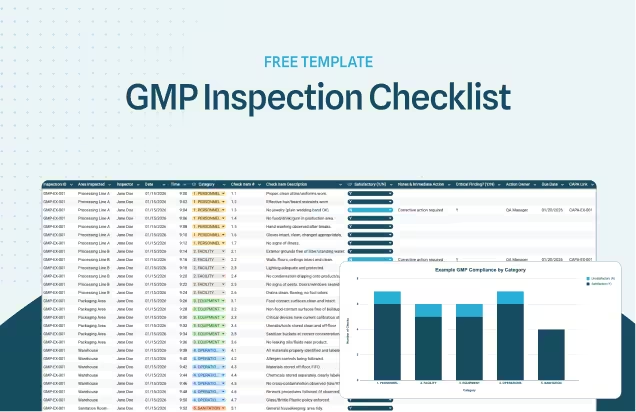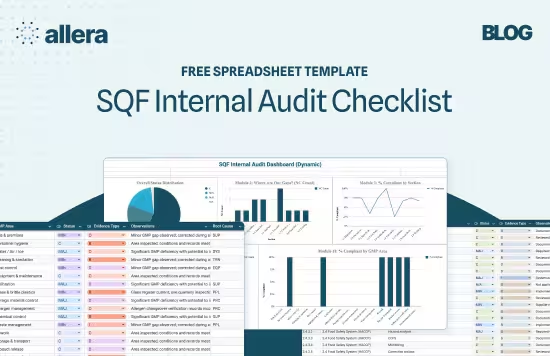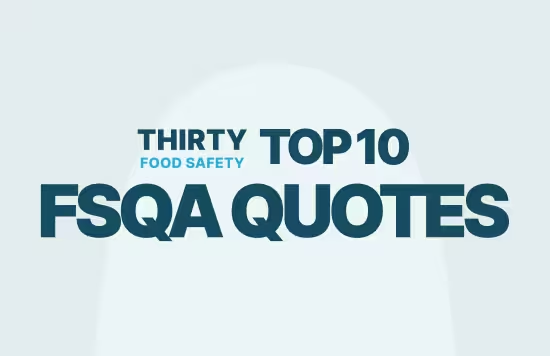

Why Food Quality Control Software is Essential for FSMA

Key Takeaways:
- A modern food quality control system–supported by food safety software–helps you align with FSMA’s preventive controls while reducing guesswork.
- Real-time insights on critical data points reduce risk, improve recall readiness, and strengthen FSMA compliance.
- Rigorous team training and smooth system integration drive consistent safety outcomes that satisfy FDA requirements.
- Ongoing performance checks let you identify quality and compliance gaps before they escalate into violations.
- Document control software for food manufacturing centralizes FSMA-required records and supports audit readiness.
Food manufacturing has never been under closer scrutiny. Contaminated products can trigger global recalls within hours, while shifting regulations demand records that are detailed and current (FDA Recall Guidance). Food quality control software helps you centralize data, track quality metrics in real time, and support collaborative solutions so your brand stays trusted.
Food Quality Control Software and Changing Regulations
Regulatory standards around food safety evolve every year. Authorities worldwide expect manufacturers to show clear evidence of tightly controlled processes, from receiving raw materials to shipping finished products (USDA Food Safety and Inspection Service).
Compliance-related documentation consumes significant hours for manufacturers, leading many to invest in centralized solutions. Beyond avoiding penalties, consistent quality builds buyer trust—retailers expand contracts with plants that reliably demonstrate strong standards.
Why Food Manufacturers Need Food Quality Control Software
Shifting from spreadsheets to digital platforms can feel daunting. But the benefits are clear: centralized data, real-time monitoring, and streamlined audits.
Centralized Data Management for Food Safety
Manually managing raw data, test results, and corrective actions creates risk. Centralized software ensures full traceability across batches and vendors.
Thinking about ways to keep your key documents organized? Try Allera's Document Control Software. It standardizes processes, ensures version control, and provides secure access to up-to-date procedures.
With centralized access, you filter by date, batch, or line—reducing investigation times and preventing risky shipments.
Real-Time Quality Tracking in Food Manufacturing
Real-time tracking prevents small issues from escalating—like spotting a cooling tank temperature spike instantly instead of hours later. Dashboards highlight production stages and alert teams if thresholds are breached.
Instant monitoring strengthens planning: anticipate equipment calibration needs, detect packaging material shortages early, or spot training gaps before they impact production.
Streamlined Food Safety Audits and Compliance
Audits become easier when reports compile logs, corrective actions, and approvals. Strong document control transforms audits into straightforward reviews instead of stressful hunts.
Building Food Safety Best Practices with Quality Control Software
Training Your Quality Control Team
Quality software succeeds only if your team understands it. Proper onboarding reduces errors and boosts consistent recordkeeping.
- Share why the platform matters.
- Provide guided tutorials.
- Assign “super-users” to support staff.
Explaining the “why” behind steps motivates employees to engage more deeply with compliance tasks.
To maximize adoption, some manufacturers roll out software in pilot programs before full deployment. This phased approach lets teams work out issues early and reduces disruption on the factory floor.
Integration with Existing Systems in Food Manufacturing
The best solutions integrate with ERP, supplier management, and inventory tracking platforms. Mapping data sources before rollout reduces duplicate entry and ensures smooth information flow.
For example, integrating with SAP or Oracle ERP systems allows production data to flow directly into compliance dashboards, eliminating hours of manual re-entry. When ingredient tracking systems are connected, supplier information and certificates automatically update in the quality control platform.
Continuous Improvement Through Food Quality Control Systems
Benchmarking Performance in Food Manufacturing
Benchmarking quality KPIs—such as rework rates, downtime, or audit scores—helps track improvement. Regular reviews expose recurring errors or supplier issues.
Software simplifies benchmarking with dashboards that display progress over time. Instead of waiting until an annual audit, teams can spot problems weekly or monthly and make adjustments before they escalate.
Forecasting Future Food Safety Needs
Predictive analysis features in modern solutions help you anticipate issues. For example, scheduling fryer maintenance before peak demand prevents costly disruptions.
Thinking ahead? Allera’s Document Control Software for predictive compliance links maintenance logs, SOPs, and quality checks, making forecasting simpler and more reliable.
Manual vs. Digital Food Quality Control: A Real-World Comparison
Many food plants still rely on clipboards, binders, or spreadsheets. While familiar, these manual methods often create bottlenecks and leave room for error. Consider the difference:
- Manual process: A line supervisor documents a temperature reading on paper, which gets filed in a cabinet. If an auditor visits months later, staff scramble to find the record, sometimes discovering it’s missing or incomplete.
- Digital process: With food quality control software, the same reading is logged instantly into a central database with timestamps and user credentials. When auditors arrive, the record is retrieved in seconds with complete accuracy.
This contrast highlights why digital adoption is accelerating in food manufacturing.
Case Study: Epicurean Butter’s Path to Quality Control Success
Epicurean Butter, a specialty food manufacturer, adopted Allera’s software to strengthen audit readiness. Before switching, the team relied on manual checklists and faced time-consuming pre-audit preparation. By moving to Allera’s document control and supplier management tools, they:
- Reduced audit preparation time by more than half.
- Improved supplier document tracking with automated reminders.
- Gained better visibility across production lines with centralized dashboards.
This case study shows how software not only reduces compliance stress but also supports business growth through operational efficiency.
Conclusion: Stay Audit-Ready with Food Quality Control Software
Food quality control software delivers real-time oversight, smoother audits, stronger team adoption, and continuous improvement.
If you’re ready to stay ahead of audits and protect your brand, explore Allera Technologies—with Document Control and Supplier Management solutions designed to keep food manufacturers compliant year-round.
.avif)





.avif)
.avif)

.avif)

.avif)


